The Pointless creator has followed up his TV success with two huge-selling thrillers – but, he tells Fitzdares, he’ll always find time for the beautiful game
Fitzdares: You’ve had a remarkable few years, with two bestselling novels out and a third on the way. That doesn’t leave much time for the one thing that matters, though… how often do you get yourself down to the Cottage?
Richard Osman: I’ve been a season ticket holder for as many years as I can remember, but recently they shut down the stand I’ve always sat in, the Riverside. Instead, they’re building this extraordinary new place with a rooftop pool. I’m there for half the matches these days, but it used to be every game for many, many years.
Fitzdares: Which must mean you were at that Juventus game…
Richard: Oh my God, yes.
Fitzdares: That’s what we want to hear about.
Richard: Well, there were zero pre-match nerves because we knew there was absolutely no way we were going to win. Down 3-1 from the first leg, we just thought it would be a bit of fun to go and see Juve. When they [Juventus] scored the first goal, that was that. The turnaround was probably the most extraordinary thing I’ve ever seen. My friend, a Liverpool fan, said it was probably the greatest match he’d ever been to.
Fitzdares: I’d go along with that. It was up there with one of the best matches I’ve ever watched, so I can’t imagine what it must’ve been like as an actual fan.
Richard: The noise, the atmosphere, the tears. Generations of Fulham fans who hadn’t seen anything like it. That’s why we watch sport. Normally you can predict what’s going to happen in that scenario – that’s what you guys do, and that’s why you make money. But I’ve been trudging along every Wednesday and Saturday for 20 years because of moments like that. And when it does happen, it means even more because it is so unexpected.
Fitzdares: You’ve touched on something more profound to football than just the result. What is it about the sport that grips us so tightly?
Richard: I’d argue, purely from a practical standpoint, that football is the greatest sport in the world. Given a level playing field, a ball, and two sets of goalposts, anyone can play. It’s always been a working man’s game, stemming from factories and workstations over a century ago, before turning professional rapidly. So, it’s in our DNA. There are really no barriers to playing. If you’re in India, you can play cricket wherever you want because of the weather, but not here. Rugby is impossible to organize at short notice. Tennis and golf are prohibitively expensive. With my TV producer’s hat on, football’s format just works.
Fitzdares: And yet, despite capturing our imagination, most football fans suffer quite regularly.
Richard: All football fans think other clubs’ fans live in the land of luxury. Most fans probably think we do over at Fulham. You can’t just look up and compare your team to a better one. There are many behind you who would just love to be in your position. We’ve been to the lowest, darkest depths of the Football League.
Fitzdares: On that note, we were having an internal debate the other day about whether, as a fan, you’d rather always be top of the Championship and never promoted or bottom of the Premier League and never relegated. Where do you side on that one?
Richard: It’s fascinating because we had 14 seasons in the Premier League, watching the best players in the world visit Craven Cottage. Occasionally, you’d beat Liverpool or United and it would be an unforgettable afternoon. Yet in the Championship you’re watching incredibly competitive football and it’s far more emotional in the stands. It’s just more fun. But, let’s face it, that’s because of the prize. Watching Mo Salah in the flesh at your local club, Kevin de Bruyne waiting to take a corner right in front of you. That’s the prize. We’re a bit of a yo-yo club these days, but we are fortunate that the owners back the team. When we do go down, they don’t panic. Hopefully, we are building a legacy that will enable us to stay in the Premier League for another 14 seasons or more.
Fitzdares: That idea of aspiration in football really strikes a chord, especially in the context of the Super League that was mooted in April 2021. What they wanted was to protect their clubs’ status at the top of the game without the jeopardy of relegation, which must have really angered you…
‘If it’s just six teams playing each other, there’s nothing to it; just Instagram stars kicking a ball to each other.’
Richard: Yes, of course. Although listen, I absolutely get it. If I was responsible for one of those teams, who knows? They’re businesses and the people at the top are protecting their clubs’ income, not their status. What they didn’t understand was that promotion and relegation are fundamental to why we love the game. If there wasn’t that danger and excitement, there would be nothing. I go to Fulham because I want us to win, to climb the league, to go top, to ultimately get promoted. That’s the formula. That football. If it’s just six teams regularly playing each other, there’s nothing to it; just Instagram stars kicking a ball to each other. I’m very glad it backfired.
Fitzdares: They saw it as a commodity that could be bought or sold. People would pay to see the best players and that would be enough.
Richard: Well, listen, if you sell Coca-Cola, you want to keep selling it forever. If you had a bad year, you wouldn’t want someone to say you couldn’t sell it anymore. That’s how they saw football – the product that couldn’t fail. They were wrong. Football’s business is that you can either win it all or lose everything. If there’s one sport that doesn’t need changing, it’s football.
Fitzdares: What sports do need changing, then?
Richard: When the governing bodies introduced three points for a win or the backpass rule, it was deliberate and effective. When football makes changes, it usually works. But there are sports that could be improved immeasurably and instantly. Tennis, for one. All matches should be first to four games across a best of five sets. You’d have the same number of games as you would across a traditional best-of-three-sets match, but far more moments of jeopardy.
Fitzdares: The worry is that it might devalue the pressure points or the importance of a set.
Richard: Look at darts, which has a few legs in each set but a lot of sets. Every moment matters, whereas in tennis, the first four or five games of a set don’t really change the momentum. That’s when we all go for a cup of tea. You can’t do that in darts, and you really shouldn’t be doing that at all if you’re watching any sport.
Fitzdares: With such short sets, you’re not allowing players to recover. Blink and a set is over. The importance of each one is therefore diminished, surely?
Richard: Comebacks so rarely happen, though. If you’re 5-0 down, you usually end up 6-0 down. As for the value of a set, it is what it is: a set. It’s always going to be exciting. You just have more of them and therefore more moments of excitement. Double, even.
Fitzdares: Then why not 45-minute football matches, and teams play each other four times a season?
Richard: Absolutely not – football is perfect as it is. It’s like Deal or No Deal. When a format works it works. If people are loving it as it is, you really don’t need to change it. There are other sports that could do with drastic change. Volleyball, for instance. I went to watch it at the Olympics. It was so physical and exciting, such a good sport, but the format was so bad. It went on for far too long, switching between servers, back and forth. Each person’s sport is so dear to them, I understand. That said, if any sport wants to approach me for an overhaul, I’m all ears.
Fitzdares: In some ways, football has changed significantly, though. Perhaps not in the actual laws of the game, but certainly in the way that it’s played. If you were to compare Arsenal’s Invincibles to today’s Man City, you’d notice a massive difference in the emphasis between the individual and the team. Back then it was Henry and Bergkamp doing something magical. Now, it’s Pep creating a fierce structure and system.
Richard: For the type of person who gambles with their heart, those days would be nostalgic. Now, people bet on the numbers, of which football has plenty; algorithms dictate everything. With my brain, I like that. It does take away some of the magic… if all you are looking for is magic. But for me, every number can tell you something. Ever since Moneyball, the growth in analysts and number crunchers has been exponential, which has had a massive impact on tactics and teams, and I certainly think there’s room for that. Having said that, if you look at the data from that Juventus game, every number tells you that Fulham should have been beaten. But there was magic that night, and there will be magic again. Especially if you keep your eye on Mo Salah.
Fitzdares: With all these existential threats to football, from heavy playing tactics to super leagues and power-hungry businessmen, what do you think the sport will look like in the next century?
Richard: If you’d been around when Preston North End were playing Blackburn Rovers, well over a century ago, and then transported yourself to the present time, you’d know what was happening on a football pitch. The whole world around you might have changed. The food, clothes, travel – all of that would confuse you, bar football. I suspect that might be the case in another hundred years’ time. Football will be with us forever.








